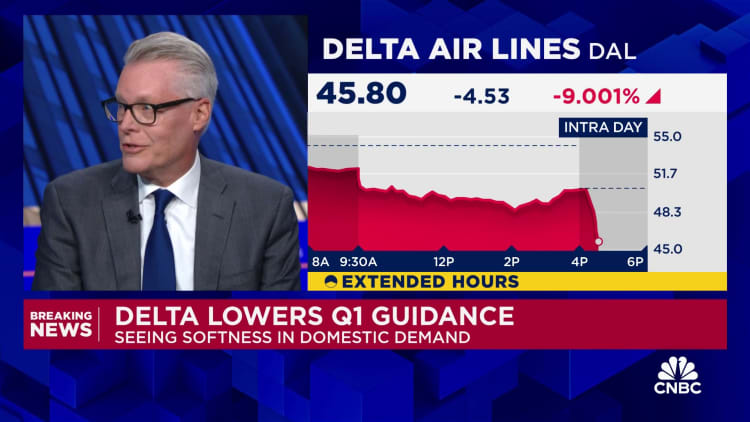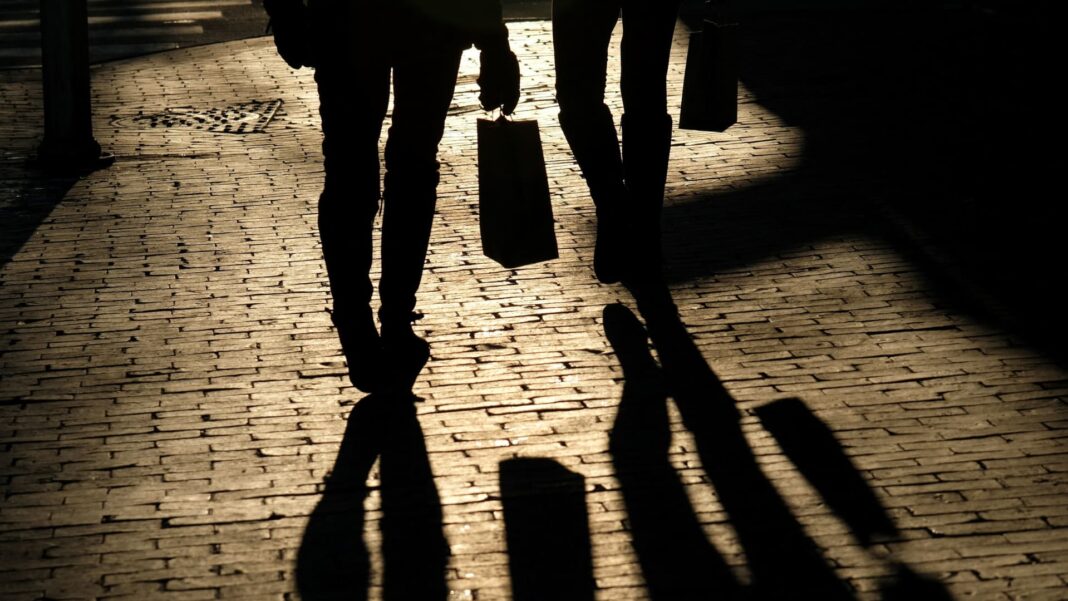Shoppers cast shadows as they carry their bags along the waterfront in Portland, Maine, U.S, December 26, 2024.
Kevin Lamarque | Reuters
It’s not just Walmart.
The leaders of companies that serve everyone from penny-pinching grocery shoppers to first-class travelers are seeing cracks in demand, a shift after resilient consumers propped up the U.S. economy for years despite prolonged inflation. On top of high interest rates and persistent inflation, CEOs are now grappling with how to handle new hurdles like on-again, off-again tariffs, mass government layoffs and worsening consumer sentiment.
Across earnings calls and investor presentations in recent weeks, retailers and other consumer-facing businesses warned that first-quarter sales were coming in softer than expected and the rest of the year might be tougher than Wall Street thought. Many of the executives blamed unseasonably cool weather and a “dynamic” macroeconomic environment, but the early days of President Donald Trump’s second term have brought new challenges — perhaps none greater than trying to plan a global business at a time when his administration shifts its trade policies by the hour.
Economists largely expect Trump’s new tariffs on goods from China, Canada and Mexico will raise prices for consumers and dampen spending at a time when inflation remains higher than the Federal Reserve’s target. In February, consumer confidence — which can help to signal how much shoppers are willing to shell out — saw the biggest drop since 2021. A separate consumer sentiment measure for March also came in worse than expected.
NYSE Arca Airline Index versus the S&P 500.
Another sign of weakness has been in air travel. The sector, especially large international airlines, had been a bright spot following the pandemic, with consumers proving again and again that they wouldn’t give up trips even in the face of the biggest jump inflation in more than four decades. This week, however, the CEOs of the four largest U.S. airlines — United, American, Delta and Southwest — said they are seeing a slowdown in demand this quarter. American, Delta and Southwest cut their first-quarter forecasts.

Plus, the strong U.S. job market of recent years is showing early signs of stress as job growth slows and unemployment ticks up.
These trends have thrown cold water on what was a red-hot stock market and sparked new fears about a potential recession, sending the S&P 500 tumbling 10% from its record highs in February, though it had recovered significant ground by Friday afternoon.
Now, as investors and executives grow more worried about the impact tariffs will have on consumer spending and fret about an administration they had high hopes for just a few months ago, even the strongest companies are striking cautious tones as the weaker ones get even louder.
Take Walmart, the retail industry’s de facto leader, which has spent the last year turning an uncertain economy into fuel for growth as it courted higher-income consumers. When Walmart announced fiscal fourth-quarter earnings last month, its stock fell after it warned that profit growth would be slower than expected in the year ahead. It was a rare warning sign from a company that tends to thrive in a weaker economy, and an indication that it’s expecting consumers to pull back from higher-margin discretionary goods in favor of essentials like milk and paper towels in the year ahead.
“We don’t want to get out over our skis here. There’s a lot of the year to play out,” Walmart’s finance chief, John David Rainey, told analysts when discussing the company’s outlook. “It’s prudent to have an outlook that is somewhat measured.”
Charly Triballeau | Afp | Getty Images
Ed Bastian, chief executive of Delta Air Lines – the most profitable U.S. carrier that has reaped the rewards of big spenders in recent years – struck a similar tone after it slashed its earnings and revenue forecast for the first quarter. In an interview Monday on CNBC’s “Closing Bell,” Bastian said that consumer confidence has weakened and that both leisure and business customers have pulled back on bookings, which led it to cut its guidance.
“Consumers in a discretionary business do not like uncertainty,” said Bastian. “And while we do believe this will be a period of time that we pass through, it is also something that we need to understand and get to calmer waters.”
To be sure, it wasn’t just fewer people booking trips that led the airline to cut its first-quarter forecast. Questions about air safety compounded the problem after two major airline accidents, including Delta’s own crash landing in Toronto, in which no one died.
Beyond Delta, rival United said it will retire 21 aircraft early, a move that aims to cut costs.
“We have also seen weakness in the demand market,” United CEO Scott Kirby said at Tuesday’s JPMorgan airline industry conference. “It started with government. Government is 2% of our business. Government adjacent, all the other consultants and contracts that go along with that are probably another 2% to 3%. That’s running down about 50% right now. So a pretty material impact in the short term.”
The airline has seen some of that dynamic “bleed over” into the domestic leisure market, as well, Kirby added. He said the company is already looking at where it will cut flights, eyeing a big drop in traffic from Canada into the U.S. and in markets that were popular with government workers.
American Airlines cut its first-quarter earnings forecast and said in addition to demand pressures, bookings were hurt after a deadly midair collision of an Army helicopter with one of its regional jets in Washington, D.C., in January.
The company also felt the pullback in government travel and associated trips like those for contractors.
“We know that there’s some follow-on effect in terms of leisure travel associated with that as well,” said CEO Robert Isom.
Airline executives were upbeat about longer-term demand in 2025, however.
Other strong companies, such as Dick’s Sporting Goods, E.l.f. Beauty and Abercrombie & Fitch, also issued weak forecasts in recent weeks, though they indicated they were feeling positive about the second half of the year.
“I do think it’s just a bit of an uncertain world out there right now,” Ed Stack, chairman of Dick’s Sporting Goods, told CNBC when asked about the company’s guidance. “What’s going to happen from a tariff standpoint? You know, if tariffs are put in place and prices rise the way that they might, what’s going to happen with the consumer?”
Over the last year, companies like United, Walmart and Abercrombie have managed to outperform the S&P 500, even as shoppers reduced discretionary spending, so this change in commentary marks a major shift. It’s a warning sign that shoppers could be starting to crack, and that even excellent execution is no match for tariff-induced price increases after four years of historic inflation.
Meanwhile, the companies that have already spent the last year calling out uncertain consumer dynamics are sounding even more worried.
“Our customers continue to report that their financial situation has worsened over the last year, as they have been negatively impacted by ongoing inflation. Many of our customers report they only have enough money for basic essentials, with some noting that they have had to sacrifice even on the necessities,” the CEO of Dollar General, Todd Vasos, said on the company’s fourth-quarter earnings call Thursday, adding customers are expecting value and convenience “more than ever.” The worsening consumer outlook has compounded the company’s own internal challenges.
“As we enter 2025,” Vasos continued. “We are not anticipating improvement in the macro environment, particularly for our core customer.”
Elsewhere in the retail industry, American Eagle on Tuesday warned that cold weather led to a slower-than-expected start to the first quarter, but said it wasn’t just temperatures. The apparel retailer specifically called out “less robust demand” and said it’s taking steps to reduce expenses and manage inventory as it braces for what’s still to come.
“[Consumers] have the fear of the unknown. Not just tariffs, not just inflation, we see the government cutting people off. They don’t know how that’s going to affect them. They see programs being cut, they don’t know how that’s going to affect them,” said CEO Jay Schottenstein. “And when people don’t know what they don’t know – they get very conservative … it makes everyone a little nervous.”

